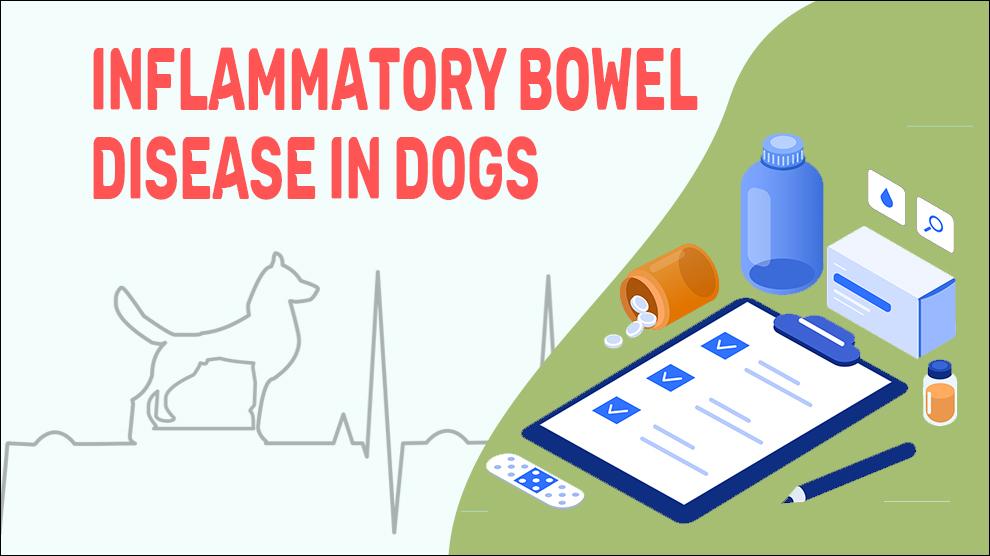Inflammatory bowel disease (IBD) is an idiopathic, multifactorial disease characterized by chronic inflammation of a dog's gastrointestinal tract distinguished by the presence of inflammatory cells (chronic enteropathies) which cannot be associated with other possible health conditions.
The continuing inflammation damages the intestinal tract and an allergic-type response then occur within the intestinal tract. Similar to Crohn’s disease in humans, this inflammation interferes and impairs the ability to digest and absorb nutrients which in turn leads to other health problems
Precise definitions subdivide the chronic enteropathies into dogs who respond to correction of dysbiosis (previously termed ‘antibiotic responsive’), dietary management (‘food responsive’) or steroid-responsive, or refractory, while those that respond to none of these and need anti-inflammatory treatment are classified as true (aka “idiopathic”) IBD.
Symptoms Of Inflammatory Bowel Disease
- Chronic Vomiting
- Chronic Diarrhea
- Weight Loss
- Hyporexia To Anorexia
- Flatulence
- Abdominal Discomfort
- Allergic Skin Disease Symptoms (E.G. Red, Itchy Ears)
- Subcutaneous Edema
- Pleural Effusion
- Ascites
- Hypoalbuminemia
Treatment Options For Inflammatory Bowel Disease
Diagnosis:
Faecal analysis: To eliminate infectious causes of diarrhea.
Blood tests: To check Eosinophilia, Neutrophilia with or without a left shift, organ function, protein, and vitamin levels.
An ultrasound scan: Within the GI tract - lumps/bumps, blockages, thickening, and/or altered layering.
Gut biopsies: Include mucosal biopsies of the stomach, duodenum, and/or ileal mucosa (ileoscopy).
Dietary management:
- Switchover to a diet that leads to antigenic modification((eg, protein hydrolysate, novel protein source.
- Exclusion diet: Removal of ingredients that a dog has previously encountered.
- A home-made balanced diet as an alternative to commercial diets.
Antibiotics: Metronidazole, tylosin, or oxytetracycline.
Anti-inflammatory and Immunosuppressive Therapy: prednisolone prednisone, Cyclosporine, Chlorambucil, Budesonide or Sulfasalazine.
Home Remedies For Inflammatory Bowel Disease
Vitamin B12 Supplementation: IBD dogs are unable to absorb this important vitamin essential to growth, hematopoiesis, and cell reproduction.
Injection: 50 mcg/kg/2 weeks, Oral: 100 to 200 mcg/kg once daily.
When dietary change gets a good response, that particular diet can be maintained for some time as long as it is balanced.
Prevention Of Inflammatory Bowel Disease
As in IBD innate and adaptive immune processes are involved, it is rarely cured and it is lifelong, but it can be easily managed with dietary and medical intervention.
Affected Breeds Of Inflammatory Bowel Disease
German Shepherd, Border Collie , Yorkshire Terrier, Cocker Spaniel, Irish setter, Soft Coated Wheaten Terrier, Basenji, Norwegian Lundehund, Boxer, Middle Age Dogs
Additional Facts For Inflammatory Bowel Disease
Causes:
The cause of IBD is not yet understood properly. Indeed, it appears to have several causes. Whatever may be the cause, the outcome is the inflammation of the lining of the intestine.
However, possible causes include:
- Abnormal immune response due to bacterial or parasitic infection ( coli, Giardia, or Salmonella)
- Hypersensitivity to a specific protein in their food
Factors associated with GI inflammation include: (as evidenced by human, canine, and feline models)
- Genetics
- Microbial factors
- Environmental factors
- The mucosal immune system and immune responses
Morbidity:
- Though the symptoms of inflammatory bowel disease (IBD) and irritable bowel syndrome (IBS) may be similar, IDB is different to IBS as these conditions have different causes.
- Inflammatory bowel disease stems from a physiological irregularity whereas Irritable bowel syndrome is usually due to psychological stress.
Mortality:
Death from IBD is uncommon.
With proper treatment, most dogs with IBD can enjoy a good quality of life.
Prognosis:
In most cases, IBD is a lifelong condition but it is manageable with appropriate treatment.
In food-responsive IBDs, complete recovery is possible and it is typically able to continue with daily activities.
As of now, the only main negative prognostic indicator for IBD in dogs has been identified as hypoalbuminemia. This necessitates more likely treatment trials to improve long-term survival in these cases.
When To See A Vet
Contact your vet right away, if you notice any of the following:
- Nutritionally compromised dogs that require intravenous feeding.
- Abscesses (pus-filled pocket of infection).
- Inflammation around the eyes, skin, or joints.
Food Suggestions For Inflammatory Bowel Disease
The 5 Rules of dietary management
- Establish a plan for dietary change.
- Plan your menus considering the nutrient requirements.
- Always look for a balanced diet considering energy needs.
- Check with your vet and offer the right food.
- Know your odds; think about what foods you must avoid.
What to feed?
- An allergen-free (hypoallergenic) balanced diet (check for thickeners, coatings, flavors).
- Choose a wholesome food, minimally-processed, that is free of preservatives, chemicals, hormones, and other toxic additives. Keep away from butylated hydroxyanisole (BHA) and ethoxyquin.
- Try an elimination diet after food sensitivity testing. Many prescribed medications for an autoimmune disease can cause GI and non-GI woes.
- Consider a diet with all essential nutrients and also provides plenty of antioxidants (combat free radicals).
- Consider a probiotic supplement with added support for the liver.
Conclusion
With a confirmed diagnosis of inflammatory bowel disease, the prognosis is generally good and the disease can be comfortably managed.
For many aged dogs, prognosis is also good with the appropriate medical or dietary intervention. Mortality rate is increased in older dogs with the presence of coexistent diseases.
Drug therapy can be continued for lifetime, while it may be possible to decrease the drug dosage eventually. Most dogs cope with a particular treatment for long time while a few require alterations in therapy every few months.

















